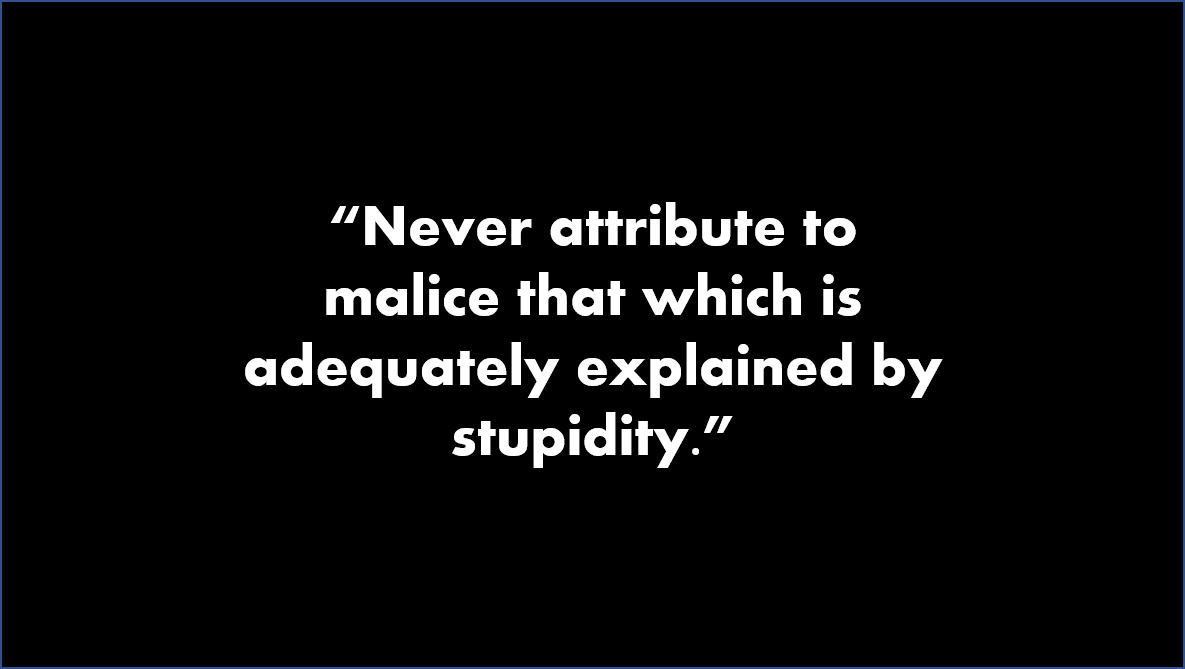Hanlon's Razor

It goes without saying that Governments have an unfortunate habit of getting things wrong and often fail to change course, even as developing events demand they should. Rather than level with the people of the country, they double down and keep spinning in the hope people won’t notice. The people do notice.
The New Zealand Labour Government’s COVID management approach looks decidedly like it’s in that category. They have used a simplistic Lock ‘n’ Vax strategy and followed a policy of jab or nothing. That is, over the last 18 months no early medical intervention has been given to Kiwis who caught COVID. This has increased the likelihood of severe illness and hospitalisation. It’s also fed the daily diet of headlines, finger-wagging warnings, and guilt-trips, should we choose not to take the novel mRNA vaccine.
The Government’s stated policy has been that the jab is all that's needed for all but a very few who are at risk of anaphylaxis. Clearly, given the emerging research, this isn't supported by the evidence. Research now shows the vaccines are less than durable and that even the vaccinated can still get infected and spread the illness. These findings obliterate the Government's policy, including for mandates and passports.
Even the vaccinated, especially if older and medically vulnerable, will need to learn how to build natural immunity and use other medications to manage illness and reduce the need for hospitalisation. New Zealand doctors have risked being struck off if they prescribed existing anti-viral medications that had a well-known health risk profile. I have little doubt that had they been able to prescribe as they clinically saw fit, it would have kept people out of hospital and even alive.
Many New Zealanders are unaware that there are effective treatments available. Medical protocols were developed in the trenches, so to speak. Through clinical observation and trial, doctors such as Vladimir Zelenko in New York and Shankara Chetty in South Africa have treated thousands of people. They kept thousands from dying too. Their track records are enviable. Sniffy comments that these are not large, randomised, peer-reviewed studies and so we can ignore them, are what they are. Ill informed.
It is often as a result of real world clinical practitioners' observation and experimentation that these large studies are then done. Not the other way around. To these doctors, upholding the Hippocratic Oath was more important than waiting years to meet arcane academic considerations. Something was better than nothing and in the very least, do no harm. Their immediate feedback on the effectiveness of treatments was to see patients kept out of hospital and returning to health.
Hospitalisation is not an inevitability of this illness, if early medical intervention is given. This is the case with all other illnesses. I even questioned my doctor on this point. “Tell me, in what other illness do we specify no treatment until someone is severely ill and needing hospitalisation?” She could not answer.
On the 11th of November the NZ Government seemed to have had a dramatic change of heart and announced that one of the new anti-viral medications would be available in a few weeks’ time. Charitably, we could assume this was their plan all along, once they got to 90% vaccinated. Cynically, I can only wonder if the recent story in the New Zealand Herald had something to do with it? A person who tested positive was sent home to isolate and was found dead some weeks later by a relative. This isn't an isolated incident.
The obvious question to ask is (and I do hope the Coroner did ask), would this sad and lonely death have been avoided if we had used a more humane policy (early medical intervention provided) and less authoritarian approach (jab or nothing) to managing the virus?
It’s preferable to assume incompetence - the Labour Government simply failed to adapt quickly enough as research evidence emerged, than to consider the alternative. They deliberately denied early medical intervention to force citizens to get the jab. The latter would suggest a serious deficit in moral compass, given people have died in part due to no early medical care, and we've known for some time the jab was less than efficacious.
